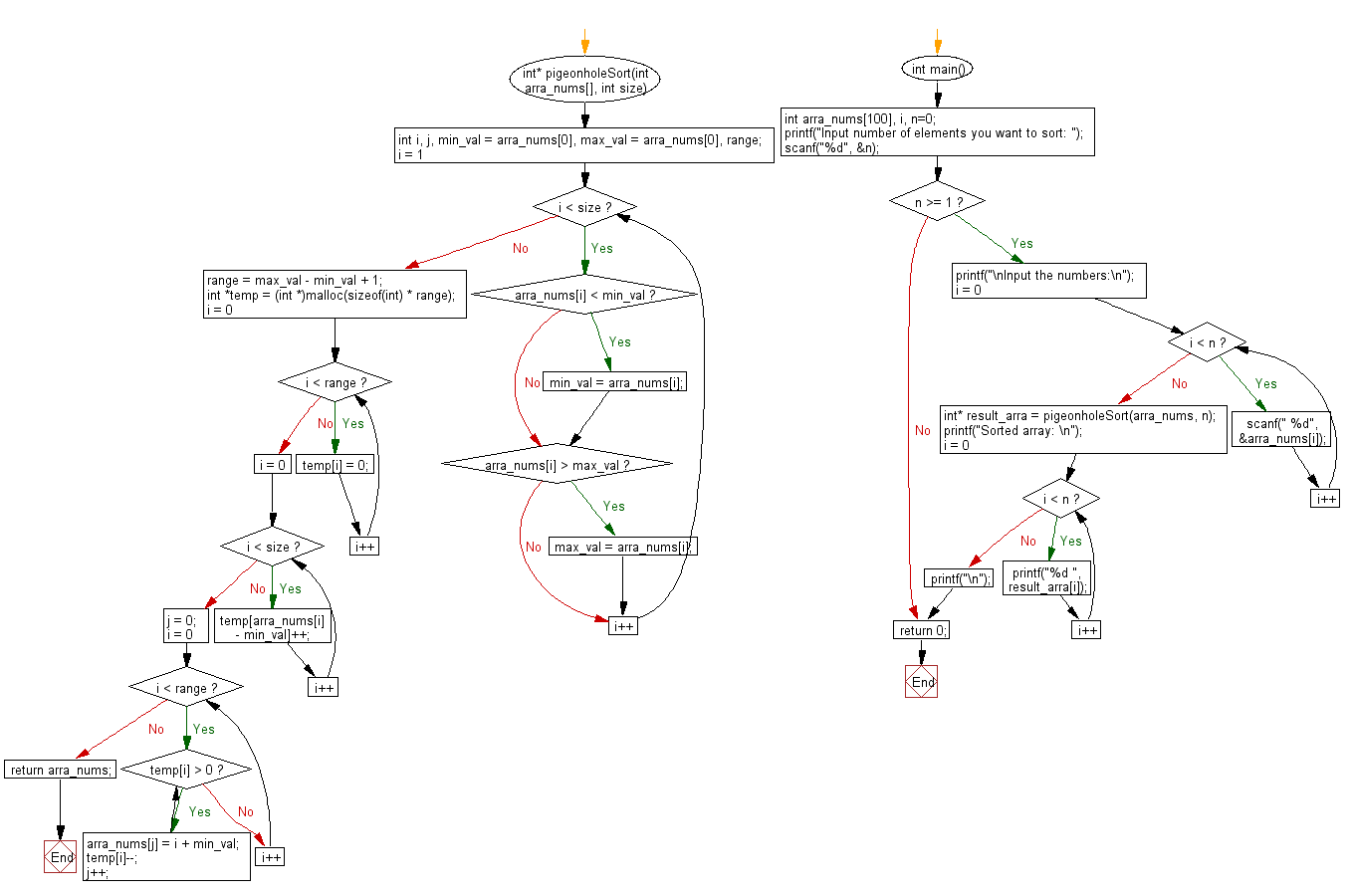C Exercises: Sort numbers using Pigeonhole sort method
20. Pigeonhole Sort Variants
Write a C program that sorts numbers using the Pigeonhole sort method.
From Wikipedia:
Pigeonhole sorting is a sorting algorithm that is suitable for sorting lists of elements where the number of elements (n) and the length of the range of possible key values (N) are approximately the same. It requires O(n + N) time. It is similar to counting sort, but differs in that it "moves items twice: once to the bucket array and again to the final destination [whereas] counting sort builds an auxiliary array then uses the array to compute each item's final destination and move the item there.
The pigeonhole algorithm works as follows:
Given an array of values to be sorted, set up an auxiliary array of initially empty "pigeonholes", one pigeonhole for each key in the range of the keys in the original array.
Going over the original array, put each value into the pigeonhole corresponding to its key, such that each pigeonhole eventually contains a list of all values with that key.
Iterate over the pigeonhole array in increasing order of keys, and for each pigeonhole, put its elements into the original array in increasing order.
Sample Solution:
Sample C Code:
# include <stdio.h>
#include <stdlib.h>
// Function to perform Pigeonhole Sort
int* pigeonholeSort(int arra_nums[], int size) {
int i, j, min_val = arra_nums[0], max_val = arra_nums[0], range;
// Find the minimum and maximum values in the array
for (i = 1; i < size; i++) {
if (arra_nums[i] < min_val)
min_val = arra_nums[i];
if (arra_nums[i] > max_val)
max_val = arra_nums[i];
}
// Calculate the range of values
range = max_val - min_val + 1;
// Create an array to store counts of each element in the range
int *temp = (int *)malloc(sizeof(int) * range);
// Initialize the temp array with zeros
for (i = 0; i < range; i++) {
temp[i] = 0;
}
// Count the occurrences of each element in the input array
for (i = 0; i < size; i++) {
temp[arra_nums[i] - min_val]++;
}
j = 0;
// Reconstruct the sorted array based on the counts
for (i = 0; i < range; i++) {
while (temp[i] > 0) {
arra_nums[j] = i + min_val;
temp[i]--;
j++;
}
}
return arra_nums;
}
// Main function
int main() {
int arra_nums[100], i, n=0;
// Input the number of elements
printf("Input number of elements you want to sort: ");
scanf("%d", &n);
// Check if there is at least one element
if ( n >= 1) {
printf("\nInput the numbers:\n");
// Input the array elements
for (i = 0; i < n; i++)
scanf(" %d", &arra_nums[i]);
// Call the pigeonholeSort function to sort the array
int* result_arra = pigeonholeSort(arra_nums, n);
// Display the sorted array
printf("Sorted array: \n");
for (i = 0; i < n; i++) {
printf("%d ", result_arra[i]);
}
printf("\n");
}
return 0;
}
Sample Output:
Input number of elements you want to sort: 5 Input the numbers: 10 11 12 13 14 15 16 17 18 19 20 Sorted array: 10 11 12 13 14 -------------------------------- Process exited after 25.3 seconds with return value 0 Press any key to continue . . .
Flowchart:

For more Practice: Solve these Related Problems:
- Write a C program to implement pigeonhole sort on an array of integers and display the number of pigeonholes used.
- Write a C program to modify pigeonhole sort to sort an array in descending order.
- Write a C program to implement pigeonhole sort on an array with negative values by shifting the key range.
- Write a C program to compare the performance of pigeonhole sort with counting sort on the same dataset.
Go to:
PREV : Randomised Quick Sort Variants.
NEXT : Partition Sort Variants.
C Programming Code Editor:
Have another way to solve this solution? Contribute your code (and comments) through Disqus.
What is the difficulty level of this exercise?
Test your Programming skills with w3resource's quiz.
